New Albums for 2025!
William Marshall – Fancy Gap Fiddle and Banjo Music – FRC735
 The FRC is pleased to announce that we’ve issued another terrific album of fiddle and banjo playing in the Old Galax style. I first learned of William Marshall while listening to Peter Hoover’s field recordings from 1959-62. I was immediately drawn to Mr. Marshall’s musicianship as well as his gentle demeanor. Many years later I heard him again, briefly, on the outstanding 5-volume “Far in the Mountains” set (you’ll be hearing more about that set in the future!). Available both on Bandcamp for listening and downloads and from our online store on CD. This is really wonderful music! —John Schwab
The FRC is pleased to announce that we’ve issued another terrific album of fiddle and banjo playing in the Old Galax style. I first learned of William Marshall while listening to Peter Hoover’s field recordings from 1959-62. I was immediately drawn to Mr. Marshall’s musicianship as well as his gentle demeanor. Many years later I heard him again, briefly, on the outstanding 5-volume “Far in the Mountains” set (you’ll be hearing more about that set in the future!). Available both on Bandcamp for listening and downloads and from our online store on CD. This is really wonderful music! —John Schwab
The Stillhouse Reelers: Had a Big Time Today – FRC740
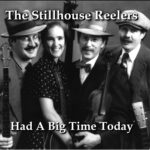 One of the best-kept secrets in the world of old-time music! Active during the 1980s,The Stillhouse Reelers mostly stuck close to home in Middle Tennessee, performing powerhouse versions of songs and tunes from the 1920s & ‘30s. Check out these testimonials from back in the day…
One of the best-kept secrets in the world of old-time music! Active during the 1980s,The Stillhouse Reelers mostly stuck close to home in Middle Tennessee, performing powerhouse versions of songs and tunes from the 1920s & ‘30s. Check out these testimonials from back in the day…
Hell-for-leather fiddle breakdowns, comic songs, sentimental ballads, rags, and gospel numbers. … Tunes and songs from famous-in-their-day entertainers … and virtual unknowns. It’s a wild, wonderful mix! Hang on tight and enjoy the ride! —Paul Wells, Former Director, Center for Popular Music, MTSU
[The Stillhouse Reelers] are the best and most authentic old-time band now working, as good as any young old-time band I have ever heard. [They] learned their music from the older generation of Nashville pickers, the ones who created the original sound of the Grand Ole Opry over 60 years ago, [and they play] with breathtaking drive and intensity. Anyone wanting to know what the Grand Ole Opry sounded like in the 1930s needs to hear The Stillhouse Reelers.—Charles Wolfe, Historian & author; member, Bluegrass Music Hall of Fame
The Stillhouse Reelers make true old-time music, and they make It sound the way it should.—Mike Seeger, New Lost City Ramblers
I was totally unprepared for The Stillhouse Reelers’ performance at the 1987 Mt. Airy Fiddlers Convention. They blew me away with their powerhouse sound, their knock-out performance and their snappy period dress.—Bob Carlin, Old-time music performer; music producer; author
Bruce Hutton 1948 – 2025
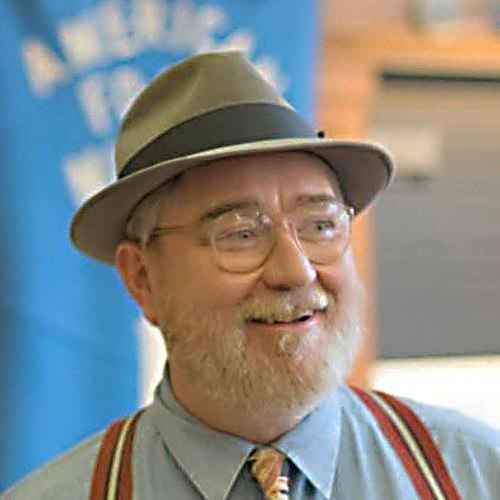 Bruce Hutton, 77, passed away peacefully on December 6, 2025, in Kemp Mill, Maryland. Born on November 28, 1948, in Dover, Massachusetts, Bruce was the son of Ruth and Will Hutton. He attended high school at the Cambridge School in Massachusetts before continuing his education at Hiram College in Ohio.
Bruce Hutton, 77, passed away peacefully on December 6, 2025, in Kemp Mill, Maryland. Born on November 28, 1948, in Dover, Massachusetts, Bruce was the son of Ruth and Will Hutton. He attended high school at the Cambridge School in Massachusetts before continuing his education at Hiram College in Ohio.
Bruce was a professional Old time musician whose career spanned decades. He performed with several groups including Double Decker Stringband and Hesperus Crossover. He also enjoyed a successful solo career, recording numerous albums and performing at thousands of school shows. Bruce was an educator at heart and felt great pride in bringing his music to the next generation .
Bruce is lovingly remembered by his sons Daniel (Deborah) and Ethan; grandchildren Max and Jacob; sister Heidi; and brother Jim; in addition to countless friends and family. He was preceded in death by his wife Debbie and his parents
Please consider donating to the Folklore Society of Greater Washington in Bruce’s Honor.
Double Decker String Band, Double Take – FRC746
 2-disc set featuring live and
2-disc set featuring live and
unreleased recordings
The Double Decker Stringband has been kind enough to open its archives to us and the result is Double Take, our first double-disc release! We’ve pulled a few tracks from their albums, but most of what you’ll hear is previously unreleased: You’ll hear a lot of live recordings here, plus demos and studio outtakes. If you heard Craig Johnson, Bill Schmidt, Bruce Hutton, John Beam and Susie Robbins play live back in the day, this release will remind you what a force they were to be reckoned with. And if you never heard them live, here’s your chance! This is driving, giddy, beautiful music. Check it out here
and on Bandcamp.
Volumes 11-15 of the NAT Survey of Traditional Music — Boxed Set!
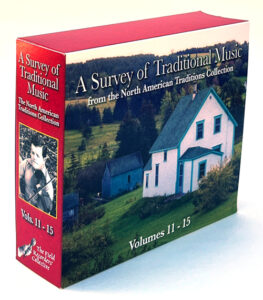 The FRC is pleased to announce the release of the final boxed set containing Volumes 11-15 of this monumental 15-volume project: In Old Kentucky, The Great Midwest, Way Down East, Gaelic in the Bow, and In Our Own Words.
The FRC is pleased to announce the release of the final boxed set containing Volumes 11-15 of this monumental 15-volume project: In Old Kentucky, The Great Midwest, Way Down East, Gaelic in the Bow, and In Our Own Words.
The physical box is now available in our online store. It is specially priced at $70 plus shipping in the continental US.
These individual discs are also available as downloads via Bandcamp: Old Kentucky, The Great Midwest, Way Down East, Gaelic in the Bow, and In Our Own Words.
Other Box Sets:
Volume 1-5: MORE INFO>>
Volume 6-10: MORE INFO>>
Bill Livers, Owen County, KY – FRC754
 Bill Livers (1911–1988) was an Owen County, Kentucky legend. He spent his life as a tenant farmer, raising tobacco and tending cattle on other people’s farms. He was the last of a family of black musicians around New Liberty, a small village settled by former slaves after the Civil War. His grandfather and uncles all played string instruments and traveled through northern and central Kentucky playing for dances, fairs, and court days. When my friends and I first met Bill, he was a spry 63 years old. The black musicians he had played with were all gone, and he was playing white country music with white musicians. Always the entertainer, he welcomed the opportunity to play with a group of younger musicians. We were young and green, but Bill’s energy and charisma brought us along, and we became his regular band. As we became more comfortable with each other, Bill began to return to the black music he had known for most of his life. His playing was unschooled, but he brought new life to everything he played. From the old fiddle tunes his grandfather had played to the popular songs of the black performers he heard on the radio, it was all in his own unique style. In these years he was able to travel more. In addition to local square dances and bar gigs, we played at the World’s Fair in Knoxville, the Washington DC Folklore Society, the Battleground Festival of Fiddle Tunes in Indiana, the Black Banjo Gathering in West Virginia, and several colleges.—John Harrod
Bill Livers (1911–1988) was an Owen County, Kentucky legend. He spent his life as a tenant farmer, raising tobacco and tending cattle on other people’s farms. He was the last of a family of black musicians around New Liberty, a small village settled by former slaves after the Civil War. His grandfather and uncles all played string instruments and traveled through northern and central Kentucky playing for dances, fairs, and court days. When my friends and I first met Bill, he was a spry 63 years old. The black musicians he had played with were all gone, and he was playing white country music with white musicians. Always the entertainer, he welcomed the opportunity to play with a group of younger musicians. We were young and green, but Bill’s energy and charisma brought us along, and we became his regular band. As we became more comfortable with each other, Bill began to return to the black music he had known for most of his life. His playing was unschooled, but he brought new life to everything he played. From the old fiddle tunes his grandfather had played to the popular songs of the black performers he heard on the radio, it was all in his own unique style. In these years he was able to travel more. In addition to local square dances and bar gigs, we played at the World’s Fair in Knoxville, the Washington DC Folklore Society, the Battleground Festival of Fiddle Tunes in Indiana, the Black Banjo Gathering in West Virginia, and several colleges.—John Harrod
Articles about Bill Livers:
Bill Livers of Owen County, Kentucky
Bill Livers: Notes on the Songs and Tunes
Kerry Blech, Appalachian Master – FRC751
 Kerry Blech loved to play fiddle tunes, but just as much, he loved to “study them and find out where they came from, and talk about them.” Throughout the years, Kerry generously shared his vast knowledge of old time fiddle tunes and their sources. This album provides an example of the kind of deep look into old time music that Kerry particularly liked to share. It captures a presentation recorded at the Appalachian String Band Music Festival (Clifftop) in 2004, where Kerry received recognition as an Appalachian Master. For his presentation, he selected and fiddled 26 obscure pieces from a variety of sources that included field recordings (both old and more recent) and commercial 78s from the ‘20s and ‘30s. The music ranges from Ohio and Pennsylvania to Arkansas, Mississippi, Louisiana, and Oklahoma. Kerry is backed by John Schwab on guitar, Kevin Enoch on bass, and Bill Schmidt on banjo. He gives each tune a brief but pertinent introduction, sharing information about the source fiddler or band, and sometimes about how he himself came upon the recording.
Kerry Blech loved to play fiddle tunes, but just as much, he loved to “study them and find out where they came from, and talk about them.” Throughout the years, Kerry generously shared his vast knowledge of old time fiddle tunes and their sources. This album provides an example of the kind of deep look into old time music that Kerry particularly liked to share. It captures a presentation recorded at the Appalachian String Band Music Festival (Clifftop) in 2004, where Kerry received recognition as an Appalachian Master. For his presentation, he selected and fiddled 26 obscure pieces from a variety of sources that included field recordings (both old and more recent) and commercial 78s from the ‘20s and ‘30s. The music ranges from Ohio and Pennsylvania to Arkansas, Mississippi, Louisiana, and Oklahoma. Kerry is backed by John Schwab on guitar, Kevin Enoch on bass, and Bill Schmidt on banjo. He gives each tune a brief but pertinent introduction, sharing information about the source fiddler or band, and sometimes about how he himself came upon the recording.
Kerry Blech Obituary
Remembering Kerry Blech by Ron Andrico
Kerry Blech – Notes on the Tunes by Mark Wilson
Lee Hammons: Central West Virginia Fiddling – FRC736
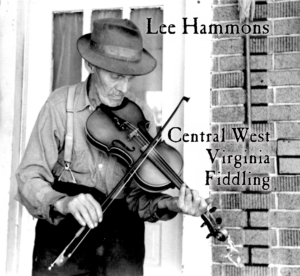 Lee Hammons plays 41 wistful, airy fiddle tunes from Central West Virginia. Like many fiddlers of his generation, Hammons quit playing music in the mid-1920s, and didn’t pick it back up until 1969. His fiddling has an heirloom quality to it—a window into those long-ago years, when he was a young man, and the music he played then. Wishful, airy, and captivating, the agedness of the tunes gives them an almost hypnotic feel. Primarily solo with occasional banjo accompaniment.
Lee Hammons plays 41 wistful, airy fiddle tunes from Central West Virginia. Like many fiddlers of his generation, Hammons quit playing music in the mid-1920s, and didn’t pick it back up until 1969. His fiddling has an heirloom quality to it—a window into those long-ago years, when he was a young man, and the music he played then. Wishful, airy, and captivating, the agedness of the tunes gives them an almost hypnotic feel. Primarily solo with occasional banjo accompaniment.
Muncy Gaultney – Traditional Music from Ashe County, NC – FRC753
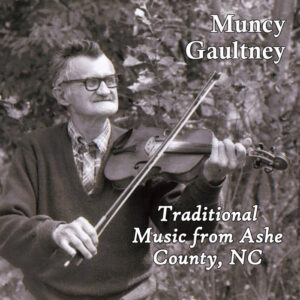 14 smooth, droning fiddle tunes played by Muncy Gaultney of Ashe County, North Carolina. In addition to being an accomplished fiddler and banjo player, Gautlney was an expert chronicler of local memories and days gone by—as owner of a small antique shop, and in a column he wrote for regional magazine The Plow. Gaultney’s wistful, reverent attitude towards the past is exemplified in the music included on this release, such as “The Walls of Jericho”—a slow, plaintive tune, which, according to Gautlney, is “supposed to be the oldest violin piece in existence.” Also included are two 1940s acetate recordings of Gautlney’s driving banjo playing, and a thoroughly entertaining 35-minute interview that showcases his good humor, penchant for jokes, and knack for storytelling while covering topics ranging from his father’s sudden death only a few weeks after his parents’ marriage—“He just laid down, and all of his breath leaked out”—to Gaultney’s single ill-fated attempt to play the accordion: “I pinched my belly, and I quit!”
14 smooth, droning fiddle tunes played by Muncy Gaultney of Ashe County, North Carolina. In addition to being an accomplished fiddler and banjo player, Gautlney was an expert chronicler of local memories and days gone by—as owner of a small antique shop, and in a column he wrote for regional magazine The Plow. Gaultney’s wistful, reverent attitude towards the past is exemplified in the music included on this release, such as “The Walls of Jericho”—a slow, plaintive tune, which, according to Gautlney, is “supposed to be the oldest violin piece in existence.” Also included are two 1940s acetate recordings of Gautlney’s driving banjo playing, and a thoroughly entertaining 35-minute interview that showcases his good humor, penchant for jokes, and knack for storytelling while covering topics ranging from his father’s sudden death only a few weeks after his parents’ marriage—“He just laid down, and all of his breath leaked out”—to Gaultney’s single ill-fated attempt to play the accordion: “I pinched my belly, and I quit!”
Dent Wimmer & Sam Conner – Floyd County String Band Music – FRC743
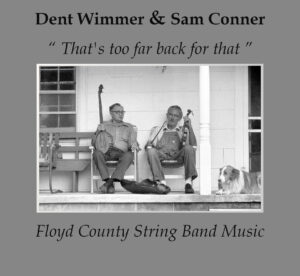 This release showcases longtime friends and musical collaborators Dent Wimmer and Sam Conner, from Floyd County Virginia, at their collaborative best. Though Wimmer’s self-described “thrashdown” style of banjo playing and Conner’s relaxed, sliding fiddling are both more-than danceable on their own, as evident on the numerous solo tracks, it’s the duets that are particularly powerful, with trance-like melodies and a deep, pulsing rhythm perfect for flatfooting. The men’s long history of playing together is clear—their playing meshes together effortlessly, and each instrument feels more at home alongside the other. Also included is ample between-tune talk on a range of topics, including the introduction of guitars to the local musical tradition (their “little strumming along wasn’t worth anything!”) and the late-night moonshine-fueled gatherings of old.
This release showcases longtime friends and musical collaborators Dent Wimmer and Sam Conner, from Floyd County Virginia, at their collaborative best. Though Wimmer’s self-described “thrashdown” style of banjo playing and Conner’s relaxed, sliding fiddling are both more-than danceable on their own, as evident on the numerous solo tracks, it’s the duets that are particularly powerful, with trance-like melodies and a deep, pulsing rhythm perfect for flatfooting. The men’s long history of playing together is clear—their playing meshes together effortlessly, and each instrument feels more at home alongside the other. Also included is ample between-tune talk on a range of topics, including the introduction of guitars to the local musical tradition (their “little strumming along wasn’t worth anything!”) and the late-night moonshine-fueled gatherings of old.
Eunice McAlexander, Ballad Singer – FRC739
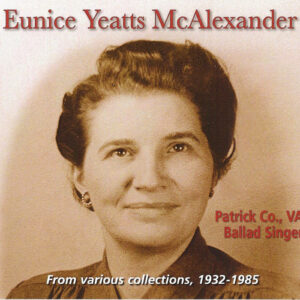 This substantial collection of fine recordings, spanning from the early 1930s to 1985, presents Eunice Yeatts McAlexander’s wide repertoire of traditional unaccompanied ballads, all performed in her clear, confident, yet still intimate, singing voice. Many of the ballads are centuries old and English in provenance, while others are more decidedly Appalachian, such as the not-so-respectable “Wild Hog in the Woods,” which McAlexander says “every old drunk in the country used to come home singing!” Dark and morally complex, the ballads are never didactic, but still have many lessons to impart. Eunice’s renditions preserve the vital heart of these old songs, allowing them to continue their journey down through the ages.
This substantial collection of fine recordings, spanning from the early 1930s to 1985, presents Eunice Yeatts McAlexander’s wide repertoire of traditional unaccompanied ballads, all performed in her clear, confident, yet still intimate, singing voice. Many of the ballads are centuries old and English in provenance, while others are more decidedly Appalachian, such as the not-so-respectable “Wild Hog in the Woods,” which McAlexander says “every old drunk in the country used to come home singing!” Dark and morally complex, the ballads are never didactic, but still have many lessons to impart. Eunice’s renditions preserve the vital heart of these old songs, allowing them to continue their journey down through the ages.
Strawberry McCloud – Bloomington Breakdown – FRC749
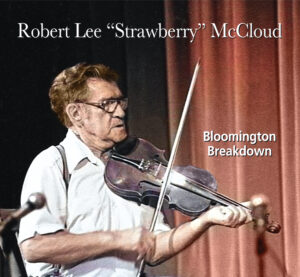 These recordings, made throughout the second half of 1970s, and primarily in Bloomington, Indiana, capture Robert Lee “Strawberry” McCloud’s grand late-life return to fiddling following a 40-year hiatus. McCloud said “bow action and good timing” were the keys to good musicianship, and his rhythmic, singular fiddling has both in spades. His repertoire draws from a wide variety of sources, ranging from the traditional tunes of his native central-eastern Kentucky, to pieces from the years he spent traveling and playing with the Georgia Wildcats in the early 30s, and also a substantial number of rags, blues, and popular songs. And yet McCloud gives a distinctive twist to everything he plays, whether it be through extra beats or unconventional turns of the melody. Accompanied by various younger musicians, this release exemplifies the winding musical paths fiddlers of McClouds generation often took, in addition to simply being a driving, rollicking good time.
These recordings, made throughout the second half of 1970s, and primarily in Bloomington, Indiana, capture Robert Lee “Strawberry” McCloud’s grand late-life return to fiddling following a 40-year hiatus. McCloud said “bow action and good timing” were the keys to good musicianship, and his rhythmic, singular fiddling has both in spades. His repertoire draws from a wide variety of sources, ranging from the traditional tunes of his native central-eastern Kentucky, to pieces from the years he spent traveling and playing with the Georgia Wildcats in the early 30s, and also a substantial number of rags, blues, and popular songs. And yet McCloud gives a distinctive twist to everything he plays, whether it be through extra beats or unconventional turns of the melody. Accompanied by various younger musicians, this release exemplifies the winding musical paths fiddlers of McClouds generation often took, in addition to simply being a driving, rollicking good time.
Just got my copy, and it is great! Strawberry’s fiddling is wonderful, backed up by excellent young Bloomington musicians who were used to playing with him and could follow the quirks of his tunes. — Brad Leftwich
Great CD, and long overdue! Strawberry was a giant of a fiddler. In my opinion he was a far more interesting and expressive musician than his compatriots Doc Roberts and Clayton McMichen. — Andy Cahan
I hope that the [Field Recorders’ Collective] can leave a legacy for future travelers, repaving the old time highway to reconstruct this music with the old timers as guides. —Ray Alden, 2003
Three CDs Recorded by Tom Carter & Blanton Owen in 1973-4
Read this excellent article by Jeremy Ray Jewell on the Arts Fuse Site about Tom Carter, the Field Recorders’ Collective, and these three FRC CDs: Hearing The Real Thing — Field Recorders’ Collective’s Commitment to Traditional American Music
Luther Davis – FRC745
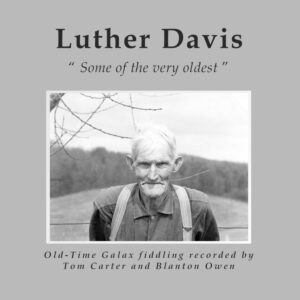 A hearty collection of old, grooving Grayson County, Virginia fiddle tunes from the 87-year-old Luther Davis. Primarily unaccompanied, though with occasional clawhammer backup from collector Tom Carter, Davis more than holds his own, though he had only recently begun fiddling again at the time these recordings were made. And despite the shake age had added to his bowing, he still fiddles admirably, shuffling, swooping and droning away with an infectiously solid sense of timing. There is also assorted between-tune talk, including Davis’s stories of how tunes got their names, and his memories of Emmett Lundy, and meandering into other, less musical topics, too—such as the tears shed at the end of years of school, and long-ago trips to Illinois, highlighting, above all else, Davis’s kindhearted nature.
A hearty collection of old, grooving Grayson County, Virginia fiddle tunes from the 87-year-old Luther Davis. Primarily unaccompanied, though with occasional clawhammer backup from collector Tom Carter, Davis more than holds his own, though he had only recently begun fiddling again at the time these recordings were made. And despite the shake age had added to his bowing, he still fiddles admirably, shuffling, swooping and droning away with an infectiously solid sense of timing. There is also assorted between-tune talk, including Davis’s stories of how tunes got their names, and his memories of Emmett Lundy, and meandering into other, less musical topics, too—such as the tears shed at the end of years of school, and long-ago trips to Illinois, highlighting, above all else, Davis’s kindhearted nature.
Hus Caudill – FRC747
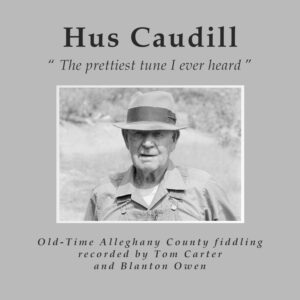 Hus Caudill, of Grayson County, Virginia, was born in the 1880s. Though he was old in his own right, many of his tunes came from an even older generation of fiddlers—that of his father, Sid Caudill, and Emmett Lundy, who Caudill knew as a young man. In this way, Caudill is a bridge to even longer-ago era which these recordings briefly resurrect. In addition to a handful of Caudill’s shimmering, jaunting solo banjo tunes, this record puts Caudill’s fiddling artistry front and center, with tasteful and beautiful clawhammer banjo accompaniment from collectors Tom Carter and Blanton Owen. Atop the banjo, Caudill’s steady, propelling fiddling shines—although his unaccompanied fiddle tunes, with their confident, sweeping double stops, are lovely in their own right, too.
Hus Caudill, of Grayson County, Virginia, was born in the 1880s. Though he was old in his own right, many of his tunes came from an even older generation of fiddlers—that of his father, Sid Caudill, and Emmett Lundy, who Caudill knew as a young man. In this way, Caudill is a bridge to even longer-ago era which these recordings briefly resurrect. In addition to a handful of Caudill’s shimmering, jaunting solo banjo tunes, this record puts Caudill’s fiddling artistry front and center, with tasteful and beautiful clawhammer banjo accompaniment from collectors Tom Carter and Blanton Owen. Atop the banjo, Caudill’s steady, propelling fiddling shines—although his unaccompanied fiddle tunes, with their confident, sweeping double stops, are lovely in their own right, too.
Luther Davis & Hus Caudill – FRC750
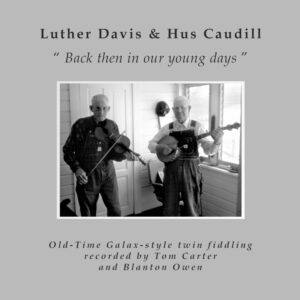 This remarkable album documents two very old friends playing fiddle together for the first time in more than 60 years—and in the all-too under-recorded twin fiddle style, no less. Luther Davis and Hus Caudill, of neighboring Grayson and Alleghany counties in Virginia and North Carolina respectively, were both born in the 1880s, and often played music together as young men. These recordings were made in the mid-1970s, after a period of many decades during which neither of the men had played much, or even at all. But despite the passage of so many years, the two fiddlers quickly settle into to a comfortable, rhythmically-pulsing groove, their two fiddle blending and singing away, transporting listener and musicians alike to those long-ago days they recall.
This remarkable album documents two very old friends playing fiddle together for the first time in more than 60 years—and in the all-too under-recorded twin fiddle style, no less. Luther Davis and Hus Caudill, of neighboring Grayson and Alleghany counties in Virginia and North Carolina respectively, were both born in the 1880s, and often played music together as young men. These recordings were made in the mid-1970s, after a period of many decades during which neither of the men had played much, or even at all. But despite the passage of so many years, the two fiddlers quickly settle into to a comfortable, rhythmically-pulsing groove, their two fiddle blending and singing away, transporting listener and musicians alike to those long-ago days they recall.
